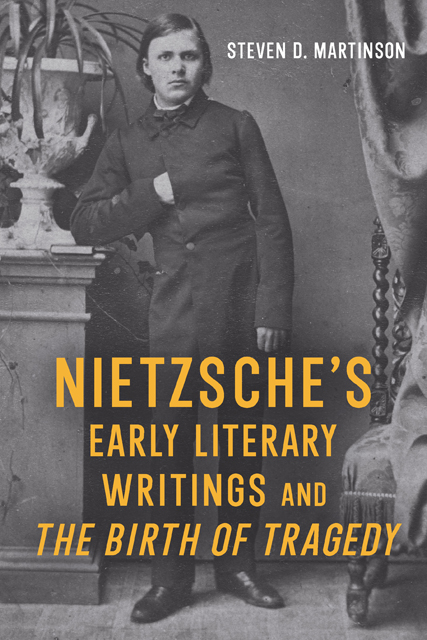4 - The Birth of Tragedy Out of the Spirit of Music
Published online by Cambridge University Press: 17 December 2022
Summary
The creative writer, musician, philologist, and aspiring philosopher in Friedrich Nietzsche merged to produce one of the most intriguing and challenging texts in the history of German literature. Die Geburt der Tragödie aus dem Geist der Musik (The Birth of Tragedy Out of the Spirit of Music; written 1871; published January 1872) is the culmination of Nietzsche's early work and the gateway to his later creative-critical writings. The work has proved to have remarkable staying power, largely because it is of significance in so many fields of inquiry. It consists of twenty-five sections.
Both philosophically and philologically inclined scholars and critics have attempted to reconstruct Nietzsche's “argument” in The Birth of Tragedy. All too often, in attempting to establish what Nietzsche was arguing (and often to advance those arguments themselves), they attribute a coherence and consistency to Nietzsche's text that is not present. They identify aspects of the text that either work against their own arguments or make observations that point in different directions. Michael S. Silk and J. P. Stern have captured the text's ambiguity: assuming that Nietzsche advanced an “argument,” they determine that such an argument is in fact “large, complicated, allusive and often elusive as well.” It is a complicated matter. Whatever argument Nietzsche may have been advancing, he did not state it directly.
Accordingly, scholars disagree about the aims of The Birth of Tragedy. Paul Daniels submits that Nietzsche “aim[ed] to situate The Birth of Tragedy as an ideal entry into [his] philosophy.” Maudemarie Clark sees it somewhat differently: “While its stated aim is to explain the origin of tragedy, the book's philosophical aim is to establish the priority of aesthetic values: to show that art is of greater value than science, and aesthetic values more important than “scholarly” ones.” Wayne Klein's salient point is that in The Birth of Tragedy Nietzsche rejects “traditional philosophical method and procedures” and eschews “linear narrative structures.” These observations are compatible with Nietzsche's creative activity. I add that the full title of Nietzsche's essay, Die Geburt der Tragödie aus dem Geist der Musik, raises the possibility that music underlies and drives much of Nietzsche's own writing on the origins of tragedy. According to Curt Janz, as well as several other scholars, music is a foundational element of Nietzsche's thought. Music exceeds the parameters of the word and philosophical concepts.
- Type
- Chapter
- Information
- Nietzsche’s Early Literary Writings and The Birth of Tragedy , pp. 186 - 249Publisher: Boydell & BrewerPrint publication year: 2022



